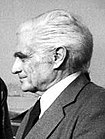Portal:Communism/Selected biography/40
Álvaro Barreirinhas Cunhal, who used the name Álvaro Cunhal (Portuguese pronunciation: [ˈaɫvɐɾu kuˈɲaɫ]; Sé Nova, Coimbra, 10 November 1913 – Lisbon, 13 June 2005), was a Portuguese politician. He was one of the major opponents of the dictatorial regime of Estado Novo. He served as secretary-general of the Portuguese Communist Party (PCP) from 1961 to 1992. He was one of the most pro-Soviet of all western Europe communist leaders, often supporting Soviet Union world policies, including the intervention in Czechoslovakia in 1968.
Cunhal was born in Coimbra, the third child of Avelino Henriques da Costa Cunhal (Seia, Seia, 28 October 1887 Coimbra, Sé Nova, 19 December 1966) and wife (m. Coimbra, Sé Nova, 22 August 1908) Mercedes Simões Ferreira Barreirinhas (Coimbra, Sé Nova, 5 May 1888 – Lisbon, 12 September 1971). His father was a lawyer in Coimbra and Seia, and later on in Lisbon, and came from a family of rural bourgeoisie, related to a rich and more aristocratic family, the Cunhal Patrício. His mother was a devout Catholic who wished her son had also become one. He also studied Law at the University of Lisbon, where he joined the PCP, then an illegal organization, in 1931. The deaths of his younger sister Maria Mansueta Barrerinhas Cunhal (Coimbra – Seia, 13 January 1921) and of his older brother António José Barreirinhas Cunhal (Coimbra, 1910 – Lisbon, 1932) struck the grief of both his parents and brothers, but specially of his mother and Álvaro, of whom they had always been close. He visited the Soviet Union for the first time in 1935 to attend the Seventh World Congress of the Comintern in Moscow. He joined the Central Committee of the PCP in 1936 at the age of 24. His first arrest occurred in 1937.

